- Home
- J. P. Donleavy
The History of the Ginger Man Page 2
The History of the Ginger Man Read online
Page 2
Ah, but then as Americans we were keeping up appearances and before the Crists had taken up residence at the address of number 1 Newtown Avenue, Blackrock, I had visited them in an abode in another more recently built suburban district, where they shared a house in two upstairs rooms rented from a respectable family in which one of the children was retarded and in which the husband appeared to have a tendency to drink. Over a short period of time Gainor’s law books seemed to mysteriously and systematically disappear and it had to be finally concluded that these tomes were finding their way to a pawnbroker and were brought there by the landlord. That this would happen in holy, Catholic Ireland and in this household reeking of respectability amazed me. And it seemed unbelievably unfair to be perpetrated upon an American gentleman who, with his academic life put in jeopardy, had come these four and a half thousand miles abroad to qualify in the profession of jurisprudence and the upholding of law and justice for all. Yet Crist seemed to regard the event with a curious equanimity and understanding, which I later found could be characteristic of him when encountering the moral frailties of another.
However, it was in this house of the disappearing law books where the first of my truly Irish social engagements of an invitation to dinner took place. And that evening, stepping out to make this visit, there wasn’t much evidence of the shimmering promise of life. Constance Crist, then pregnant, with an apologetic charm presented me with a mound of spinach and a boiled potato on a plate. But upon that evening in that house she was a beautifully voweled, outspoken lady, and one was fed a wonderful diatribe by my hostess, who was not exactly enamored of the Irish. And by God, when she had a mind to, did she let them have it from every moral, ethical and sanitary direction. And then with my host there occurred an animated discussion on accents and the power such wielded when emanating from the lips of those so blessed. Present also was Randall Hillis, Crist’s brother-in-law, who fought as a Canadian in the war and who was at the time sharing a house out on a windswept Howth Head with George Roy Hill, later to be the famed film director. Hillis said that George Hill was attempting to perfect a British accent to perform a part in a play he was producing at Dublin’s Gaiety Theatre and that Hill would be extremely envious of Crist’s and my somewhat anglicized accents. As indeed both of us were even thought capable of passing as British. Proof enough that we were all much fascinated if not concerned with the pronounced class divisions in Ireland, and as Crist described it, the double-edged social sword that we as Americans wielded with our phonetics. With the further advantage that, as our quasi-British accents might slip, we had another and even better one underneath.
Now believe me when I say I may have sounded as my rearing would suggest, born in Brooklyn and raised in the Bronx, which would prompt any interested person to ask, where on earth did Crist and especially I get such accents that would be having folk get the idea we could be Englishmen. Well, curiously enough, both Crist and I had, upon each of us recalling, many an occasion and incident of having to run the risk of physically defending ourselves from fellow Americans who were unkindly crass enough to inquire,
“Hey, bud, where did you get that accent from.”
And both of us certainly, especially in the U.S. Navy, had occasion to raise our fists to defend our vowels. However, even to this day, such accents can be heard in Boston as they were when I briefly lived there, and had occasion to venture into that venerable pharmacy Clough and Schackley on the corner of Beacon and Charles streets on Beacon Hill. Where elegant ladies purchased their toiletries and medical prescriptions. If such accents were not found a dime a dozen, then they were encountered at a much higher price. But both Crist and I, upon the moment of stepping ashore in Ireland, had our considerably anglicized phonetics remarked upon.
Now on another and different level of the many levels existing in Dublin, accents didn’t matter a damn in this city aflood with beer and alive and aloud with festivity. Nor did they matter in the bashes, the hooleys and in the pursuit of harlotry, from the aftermath of which one awoke disorientated and bleary-eyed and often unable to speak at all. The cure generally coming following coffee in Bewley’s Oriental Cafe, and when, at a decent interval after lunch, one was ready again to bash on regardless. Ah, but one did too take major steps in life between these strange parties that persisted days and sometimes weeks from one place to another all over the country. And often in the midst of such shenanigans appeared Gainor Stephen Crist especially assisting and overseeing, as he assiduously did, the moral good. “Values” and “duty” were his watchwords. “Do no evil” was his contention. And to those who did do evil, a wooling would be administered. This consisting of throwing the evildoer down on his back and, with Crist’s hands dug deep in his hair, banging his head up and down on the floor while at the same time shouting the bastard’s crime in his face. We became good companions because I wholeheartedly agreed with this highly effective meting out of ethical standards.
Crist, above all, was a marvelously patient man. He would quietly listen as I pontificated on my intended aspirations of conquering the universe. Or at least doing something that might get my name in the paper. And possessing that strange air of propriety of the middle westerner, Crist was always instantly ready with fatherly advice. Upon a letter plopping in the letterbox of my college rooms from Valerie in which she mentioned marriage, Crist was swift to seize me by the wrist and lead me outside the university to telegraph an immediate answer saying yes. That accomplished and as an old hand engaged in such condition, he lectured me on the codes and protocols to be observed in a contented state of matrimony. And I believed his every word. While not yet knowing that my answer agreeing to marry Valerie now frightened the life out of her.
Although growing up in America and having experienced the rough and tumble of naval life, I was still at the age of twenty only just putting my youthful years behind me and hardly ready for matrimony. But to Crist, a few years my senior, my tender youth concerned him not. He was not even to know that Valerie was tall, exquisitely formed and stunningly beautiful and had the most exquisite of British accents and that I should be very glad to marry her. She was also a speech therapist with a modestly nice income based in St. Albans in Hertfordshire and very successfully supporting herself. But I was aware that the world was a tough arena and that there was many a barefaced trauma ahead to be fought two-fisted for survival. Matrimony would also mean dislodging from one’s comfortable university life, which even with Trinity’s primitive plumbing, was a place of paradise. My G.I. Bill of Rights plus an allowance sent by my faithful mother gave me a considerable income to indifferently spend in this city, where my college servant, Noctor, was supporting a wife and three children on a quarter of what I might spend on an extravagant evening out and which left me constantly short of funds. And on one or two Sundays, weekend occasions actually had me broke. And such was my inextinguishable American optimism that I was left stunned and affronted to be moneyless.
For the quarterly sum of eighteen pounds, eight shillings and eleven pence, one was all found at college. Which included a sitting room, bedroom, scullery and entrance hall plus servant, gas and electricity, a daily bottle of milk and an evening meal on commons. The latter where, following a Latin prayer mouthed by a college scholar, there appeared potatoes, slabs of meat, a vegetable and a pudding, all washed down with a special brew provided by Guinness’s brewery. And if one found polite people to sit next to who remembered to pass condiments and comestibles, all could be extremely pleasant. There were too, constant generous occasions of hospitality all over Dublin with very few hours ever going by without someone or something inciting some celebration. And one could drift from one to another, frequenting the innards of drawing rooms or pubs and hotels, which were a few steps in every direction all over the city. And as for country houses, one needed only someone sober enough to steer an automobile straight for a few miles or around a few dangerous corners to enter some mansion beyond some wooded copse where much eccentric goings-on would be goin
g on and, provided you were appropriately affable, you could eat and drink to your heart’s content and be merry if you could and sleep where you collapsed.
Ah, but what about literature and art. The hope to be part of which throbbed in every citizen’s heart. And made the excuse for him to go on living the next day and the next with the indifferent present being made tolerable by adorning the days ahead with rosy dreams. These, for target practice, always being promptly shot down in flames by your listeners, who in a public house, need have no mind for having to please a host or hostess. And what there was of an intellectual social life, rather than being conducted in the salons of Dublin and country houses as it seemed to have been in the decades previously, was nearly entirely exercised where drink was for sale or available in one or two of the more impromptu places such as McDaid’s pub or that now legendary basement redoubt, the Catacombs. Where the disgraceful could, ad lib, democratically further disgrace themselves.
There was for the citizens at large a casual carelessness about Dublin life. And with aesthetic unself-consciousness and the previously mentioned face-breaking being rampant at the time, and wine, women and song being the priority, no one knew or much cared that a so-called literary period was then hugely in the making. Comeuppance and instant amusement were all the rage, and you were as good as your last fist thrown or witticism uttered. While delving into the problem of obtaining a lifetime private income, food, not for thought but to devour, was on every mind. And if little hope of that was to be had, then a drink held in your fist was, at least for the pleasant moment, the preferred substitute. And you could rage your way toward hell taking comfort from the fact that publoads of companions were aboard on the same trip and you’d have the feeling on the way that with yourself and them with you, gone, there was no world worth talking about left.
Now, there were one or two exceptions to all this deprivation and behavior. And one of these was John Ryan, my first publisher, who presented my earliest writing, a short story, “A Party on Saturday Afternoon,” in the pages of his magazine, Envoy. Ryan, an invariably polite, quiet and somewhat shy individual, would, when at the bar of a pub, patiently listen to anyone’s stories and if prompted sufficiently could tell splendid tales of his own. He was also that rare man in Irish life who could harbor many a secret from which, I suspect, came much of the wisdom lurking in his words. Ryan, with whom I’d nearly intended to start Envoy but demurred when I felt it would invite the famed and ignore the unsung, was instead joined by other editors, friends of mine, and as it would seem, as always happens with good friends, the first literary effort I submitted to be published was voted down by the very man I’d introduced to join Ryan on the magazine. Ryan, however, approving the story and having heard it read aloud to his admiring, beautiful, film star sister Kathleen, and having supplied the finance to start the magazine, also supplied the final decision to publish it. And the experience serving me well and making me forever afterward a permanent outsider to literary life.
But more about the worthy Ryan. Who in Dublin was unique. As the poor mouths, the poets and the celibates roamed Dublin to cadge what they could of sustenance, Ryan was one of the few who personally had available to him both food and drink in plentisome quantity, courtesy of a mother who was as intrepid as she was charming and who ran her considerable business of the Monument Creameries. Ryan was unostentatious to the point of sometimes being a seasonably dressed vagrant. But with money to spare, and able to elect to a degree what he did with his time, he could have done as nearly all did, and spend his days racing and dining evenings at Jammets, the Red Bank or the Dolphin Hotel with jodhpured cronies. However, as much of this life as Ryan led, he always imposed upon it his abiding consciousness of the value and worth of the writers, painters and poets of the period. Nor did he ignore the nonwriting, noncomposing, nonpainting eccentrics who lurked and scurried everywhere, including Mickey Mears, the gas meter reader who rode his motorbike called Thunderbird and who always seemed to be at one’s elbow ready to appreciate a bon mot.
Ryan chose too, to be interested in his native city and the relics left by so many of its literary sons, who had fled or been driven out. And no population, perhaps excepting the Viennese, has ever existed so implacably an enemy of the inspired, as did the people of Ireland. It was nearly as if to redress such wrong that Ryan had collected their books, music and pictures, and let it be known that such banned and ridiculed things were still to be seen and heard back in the creator’s native land and that there remained at least one man there who kept their names alive and held them in high esteem. For Ryan was himself, as well as a publican and publisher, also a creator of painting, writing and music. And he in turn self-effacingly cherished and nourished those in the same pursuit, who, embattled, still remained in this land so hostile to their survival. It was in Ryan’s uncharacteristically sumptuous Grafton Street studio where I first heard Joyce’s voice reading in its strange haunting tones from Finnegans Wake. And where too, the then largely unknown Irish composer’s compositions were played on the gramophone.
It was usually at midmorning that Ryan would appear socially, having earlier traveled in from Burton Hall, his mother’s estate upon which stood her vastly splendid Georgian mansion. He’d park his car somewhere discreet in a Dublin side street and with a newspaper tucked somewhere upon his person, would stroll the distance to 37 Grafton Street, nodding recognitions as he went and watching out to avoid the worst of chancers. When confronted, he would be a ready repository for news or able to report that which was soon to become news and which was already undergoing its transition into gossip turned into a fine art. And Ryan listened to all mouths and spoke into all ears. He would never ignore, as many did, the awestruck bus conductors and sewer inspectors who edged near to be in the intellectual vicinity of the greatness of poets. Nor would turn his back on the chancers who swarmed about him exerting their charm, looking for loans or the guarantee for same in order to launch their soon-to-be-aborted money-making schemes. Thus, with Ryan invariably remaining imperturbably benign to and indulgent of all, did he become himself a dependable focus in a land where begrudgers abounded during a period of censorship and religious repression and when the philistine and pompous pedants held full sway, albeit with all kinds of shockingly prurient behavior omnipresent. And Ryan forever in Dublin’s midst and privy to the deepest and darkest moments of Dublin life now seems, if less eccentric, to be yet one more of the characters to strangely lurk behind every word of The Ginger Man.
Who once was
A transient tourist
In that
Intimate of
Intimate cities
4
RARELY DID ANYTHING happen in Dublin by plan. It was always to go out the front gates of Trinity and into the city to let come what may. Ah, but there were the odd previously designed occasions. And given this head start, the botch and bungle and faux pas had a marvelous opportunity for a field day.
As you might imagine, such a rich and handsome young man as John Ryan was, he might sooner than later, as I had already done, marry a beautiful girl. Which he did. And in so doing provided the scene for a mightily and exotically wonderful wedding day. Upon which the intrepid Gainor Stephen Crist as head usher would attend in full correctness and with due protocol, acquitting himself in the manner of the American Brahmin he was. But at that moment in Ireland he was without his proper kit for such duty and occasion. When it was suggested he rent such clothes, the suggestion was met with the steely, icy glare it deserved. And he cabled to have his morning suit and top hat expressed across the Atlantic by motor bird.
It was not till the very eve before the wedding that the postman at last knocked and Crist’s sartorial social equipment, made for him by the best tailor in Dayton, Ohio, duly arrived. But his dress shirt had taken on a rather gloomy faded shade of light brown, which he insisted and then implored his long-suffering wife, Constance, who was to remain behind next day baby-sitting, to launder. Although a lady who could suddenly
decide to take no nonsense from anyone and who could converse with Gainor by them both clicking their teeth in Morse code, she did duly take and soak overnight this garment in soap suds. But now in the morning the shirt had little time to dry. And the old clanking alarm clock on the mantel was ticking away the hour. Crist and Ryan and Patricia, the to-be bride, had long been delighted friends and both the latter agreed that Gainor was a master of courtliness and social procedure and it was incumbent upon Gainor to get to the church on time. And what matter a slightly sopping shirt under his tailcoat, provided the collar was presentable. And a makeshift ironing board was produced in the tiny kitchen. As the table had recently suffered irreparable damage the day before when Gainor in a rage that his morning suit had not yet arrived, had quite rightly kicked this otherwise useful piece of culinary furniture around the room.
A green door formerly on its hinges was now laid across the wobbly former frame of the kitchen table. A towel hurriedly thrown over it. The iron allowed to heat. And the rapid pressing commenced in a cloud of steam while Crist searched for his suddenly disappeared black shoes. Which had already in the last hour, along with his other pairs of shoes, been chewed beyond recognition by the Great Dane puppy gift from his aunt for whom the leather served as a canine breakfast, the poor dog not having recently got its daily ration of two pounds of steak and two pints of milk. I arrived then in the midst of all this tragedy just as Gainor was screaming,

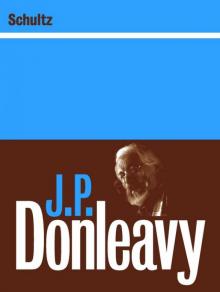 Schultz
Schultz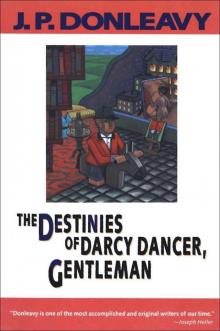 The Destinies of Darcy Dancer, Gentleman
The Destinies of Darcy Dancer, Gentleman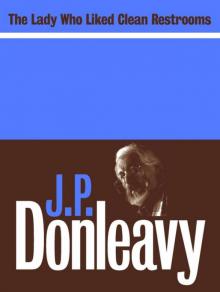 The Lady Who Liked Clean Restrooms
The Lady Who Liked Clean Restrooms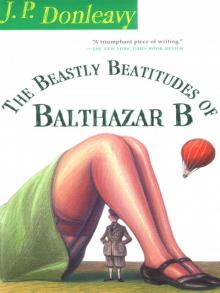 The Beastly Beatitudes of Balthazar B
The Beastly Beatitudes of Balthazar B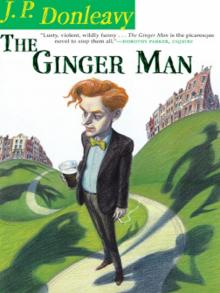 The Ginger Man
The Ginger Man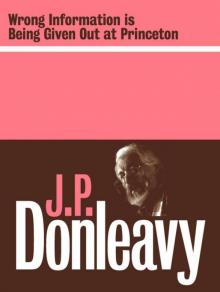 Wrong Information Is Being Given Out at Princeton
Wrong Information Is Being Given Out at Princeton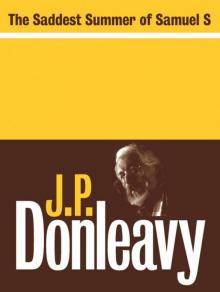 The Saddest Summer of Samuel S
The Saddest Summer of Samuel S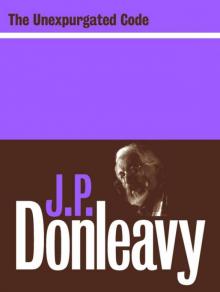 The Unexpurgated Code
The Unexpurgated Code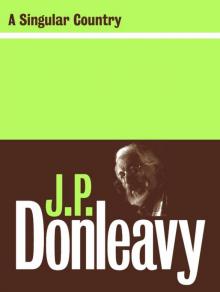 A Singular Country
A Singular Country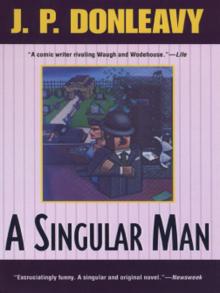 A Singular Man
A Singular Man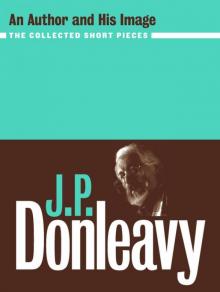 J.P. Donleavy: An Author and His Image
J.P. Donleavy: An Author and His Image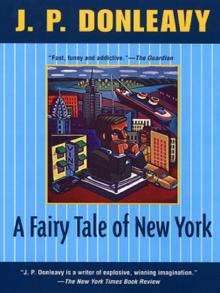 A Fairy Tale of New York
A Fairy Tale of New York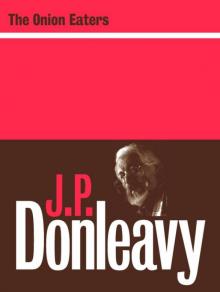 The Onion Eaters
The Onion Eaters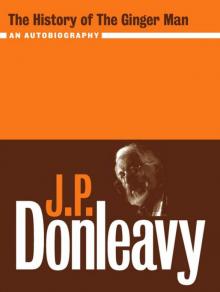 The History of the Ginger Man: An Autobiography
The History of the Ginger Man: An Autobiography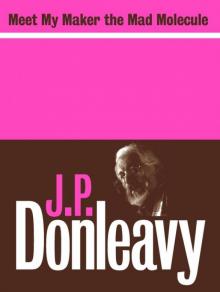 Meet My Maker the Mad Molecule
Meet My Maker the Mad Molecule Leila
Leila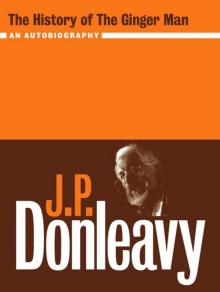 The History of the Ginger Man
The History of the Ginger Man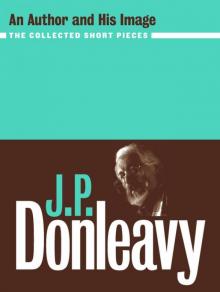 J.P. Donleavy
J.P. Donleavy